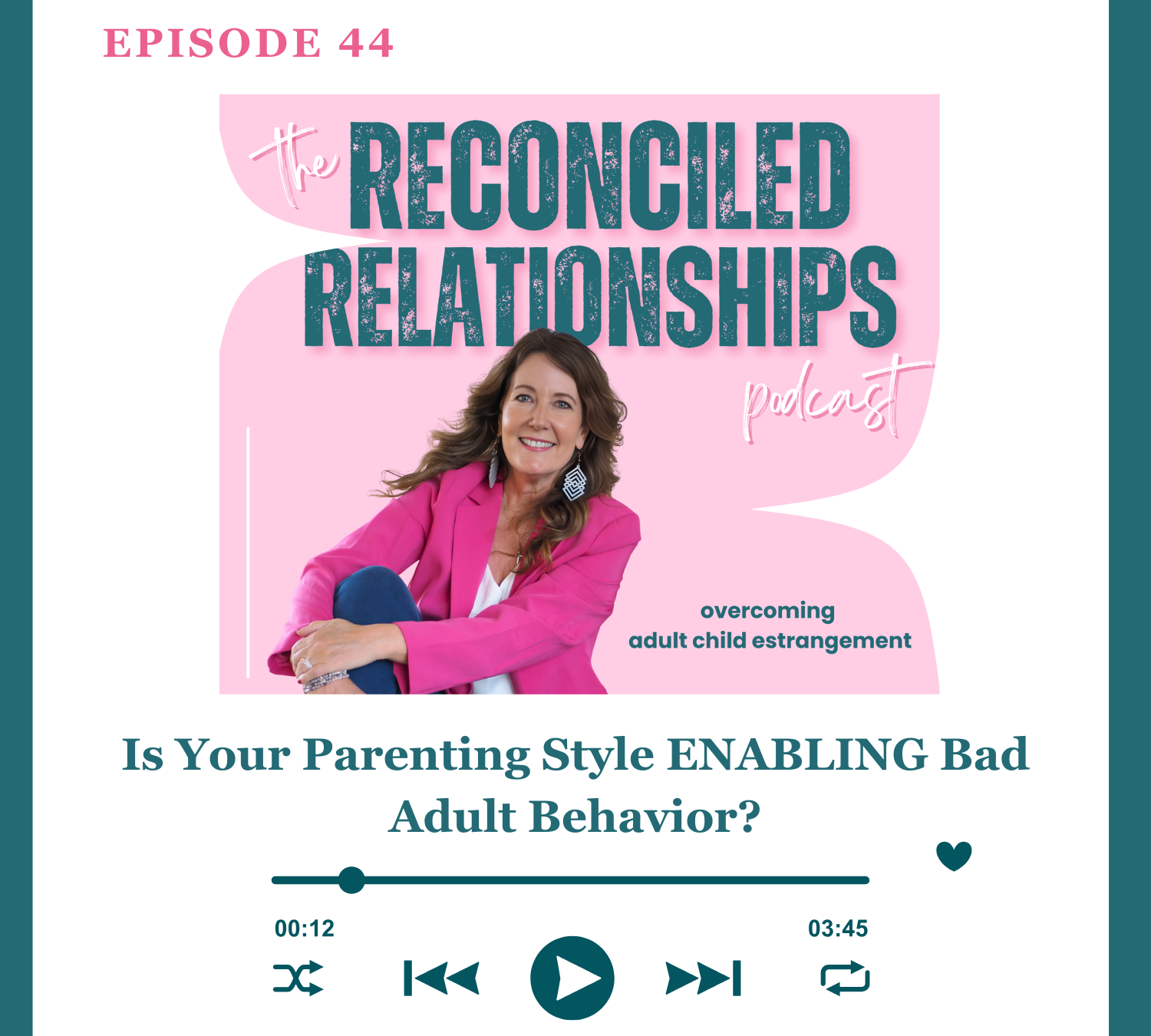WATCH THE EPISODE BELOW
LISTEN TO THE EPISODE BELOW
Have you ever felt like your love for your adult child is doing more harm than good? In this eye-opening episode, we unpack the difference between helping and enabling—and the emotional toll it takes on moms.
From covering up their mistakes to giving money you can’t afford, overfunctioning leaves you depleted and keeps your child from growing. But there is hope.
You'll learn how boundaries aren't rejection, but an act of love that teaches responsibility and respect. If you’ve been walking on eggshells or carrying the weight of trying to fix everything, this episode is a gentle but firm invitation to step into a healthier dynamic—one that honors both your love for your child and your peace.
Letting go isn’t the end; it’s the beginning of real growth, for both of you.
KEYPOINTS FROM THIS EPISODE
-
Enabling vs. Helping – What looks like love can actually keep adult children stuck, especially when moms overfunction.
-
The Emotional Cost – Saying yes when your heart says no drains your emotional peace and can lead to resentment and anxiety.
-
Boundaries Are Love in Action – Boundaries aren't rejection; they are a reset that teaches responsibility and respect.
-
Growth Requires Discomfort – Shielding adult children from consequences may stunt their maturity and problem-solving skills.
-
Letting Go Isn’t Giving Up – It's stepping aside so your child can grow—and so you can heal.
QUOTABLE MOMENTS
-
“You are overfunctioning so they don’t have to.”
-
“Every time you say yes to something that violates your peace, you say no to yourself.”
-
“Boundaries are not rejection. They are a reset.”
-
“Love can be firm. Love can say no. Love can have limits.”
-
“Letting go doesn’t mean you’re giving up—it means stepping out of the way so God can step in.”
TRANSCRIPT OF THIS EPISODE
[00:00:00] Have you ever wondered if your love for your adult child is actually hurting more than it's helping? And what I mean by that is I want you to ask yourself, are you constantly stepping in, giving money, smoothing things over? Or on the flip side, are you staying silent just to avoid conflict? But deep down, you are exhausted and nothing's getting better.
this might be one of the hardest truths to face as a mom. But what if the help that you're giving is actually keeping them stuck? let's talk about how enabling works, how it affects you, and how to step into that healthier role without losing yourself in the process.
Number one is what does enabling really look like? enabling is when we over-function so they don't have to. And I know that was probably a huge sentence for many of you where your heart [00:01:00] probably just sunk to your gut. You are over-functioning, so they don't have to, it's about protection. It's when love turns into almost rescue and protection becomes this barrier to responsibility that they don't know what that means.
it can be that drastic, or sometimes it can be really subtle. Maybe it's covering up their mistakes, Maybe it's giving money even though it's never used wisely.
Maybe it's pretending things are fine to avoid blowups because you've been there before and don't wanna go there again. Maybe it's saying yes when your heart is screaming. No. I don't wanna do that. No, I don't have the money, or I don't wanna give you the money. But you still say yes. Maybe it's taking the blame just to avoid the silent treatment because you're scared.[00:02:00]
It might look like support on the surface, but deep down, you know it's creating imbalance. It's creating imbalance for you and the relationship because you feel like the relationship is one sided and it's leaving you, the mom, emotionally bankrupt. I don't care how much money in the world you have or if you are super poor, it makes no difference because you know why that is the same no matter what.
It's the fact that there's no responsibility, whether it's a hindrance or a hardship for you, or you don't even miss it. Either way, it doesn't matter. But I want you to remember that this is not about blaming yourself. It's about seeing what's not working and choosing a healthier way forward. Number two is the hidden cost.
The hidden cost to you, the mom. Because every time you say yes to something that violates your peace, you say [00:03:00] no to yourself. You say no to your own emotional health. And what happens is enabling can often lead to resentment. You start feeling taken advantage of. Even if you never actually verbalize it to them, you feel that way.
You may have anxiety, you feel like you're on high alert all the time. You're constantly, trying to manage their emotions or avoid the next crisis. Maybe you have shame or confusion and you wonder why do I feel like such a bad mom when I'm doing everything I can? And deep down, many of you fear that if I stop helping, will I lose them forever.
But it also keeps you stuck in a cycle that's not helping them grow, and at the same time, it's draining you. So if any part of this hits home for you, I wanna personally invite you to schedule a 30 minute call with me. It is not a coaching call, it is a consultation for moms who are ready to dive into coaching.
And you wanna learn more about that. It [00:04:00] is a focus call where we're gonna talk through, what's your facing, and I wanna help you explore what kind of support could best fit your journey because you don't have to keep carrying this alone. the link to schedule that is in the show notes below.
Number three, why boundaries are a loving act. boundaries are not rejection. They are a reset. They say, I love you. I love you, son. I love you, daughter, but I love myself too. some of you may be struggling with that because you've done this for so long and my heart hurts for you.
This is all you've ever known and you fear stopping. You may actually be able to say to them, some of you, I'm not in a place to help financially, but I can pray for you. I can cheer you on. I can be here in other ways. if the conversation turns hurtful, I'm gonna need to end the call and we can [00:05:00] try again later.
Remember, we teach people how to treat us, and that includes our kids. if the conversation turns bad and maybe you're being yelled at, you say, I'm not okay with being yelled at or cursed at, even if you're upset. In other words, it doesn't give you justification to treat me this way.
these statements can be hard at first. but they're rooted in truth and they create almost like a new standard for the relationship because if you have no boundaries, your adult son or daughter is going to continue be Continue to believe that your love means unlimited access regardless of behavior, But when we have some boundaries, they can begin to see. Love can be firm. Love can say no, and love can have limits. But guess what? My parents are still there for me. Doesn't mean cutting them off and walking away and want nothing to do with 'em. That's not it. Boundaries don't end relationships. They teach responsibility [00:06:00] and respect within them.
I know what you're thinking. You don't know my son or daughter, and they are not gonna go for that. And you know what? Temporarily, they may not. But that is a risk you may have to take to get an authentic relationship with your child in the long run. You're doing them a favor right now by implementing some of these things.
number four is the truth about growth. You know, enabling can feel like you're helping, actually. Stunts your child's growth. And when we constantly solve, fix or soften everything for someone, we prevent them from learning how to handle it. I always tell my clients, what would they do if, God forbid you were hit by a bus?
most of them are like, oh my gosh, I don't know. How will they handle this? They need to learn how to navigate consequences. Because of life and the world has consequences. Not just your consequences in the family, but There's [00:07:00] consequences everywhere to our actions. they need to be able to problem solve, face some discomfort, and see themselves bounce back from it.
It only takes a few times to be able to do that on your own, to be like, wow, I do have this in me. I'm stronger than I gave myself credit for. I can do this. But we want them to take responsibility for their choices. And I know that you want that ultimately for them because if you think about it, back when they were learning how to walk, we don't carry them everywhere so they don't fall.
We let them wobble, fall, cry, and try again and get back up. That's how they build strength. the same principle really does apply to emotional, spiritual, and life maturity. your child needs those moments of struggle to grow. I always say, think back to your own life and how many times in your own life did you get through something that you're like, I cannot believe I ever got to the other side of that.
They [00:08:00] need to be able to have those memories too. And just remember that letting go doesn't mean you're giving up. You are stepping out of the way so God can step in. I hope that helped you today. I will see you in the next episode. God bless.



